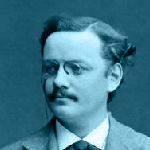Johan Gustaf Knut Wicksell was born on 20 December 1851, in Stockholm, Sweden. He is best known as a leading thinker in the field of political economics, having deeply influenced the Stockholm School, as well as the Keynesian and Austrian schools of economic thought.
Wicksell came from a reasonably wealthy middleclass family, but was left orphaned at the age of sixteen. His father’s substantial estate left enough funds for the young Wicksell to enrol at the
University of Uppsala in 1869 to study mathematics and physics. He graduated in 1871 and continued his studies, receiving his doctorate in 1885. Two years later, Wicksell was awarded a scholarship to study on the continent, where he was enthused by the lectures of Carl Menger, the famous Austrian economist. It was around this time Wicksell became interested in the field.
He married Anna Bugge in 1887, with whom he lived in some financial difficulty, struggling on a small income from sporadic university positions and publications. In 1892 Wicksell published his first work on economics;
Value, Capital and Rent, to little critical acclaim. Undeterred however, he published
Studies in the theory of Public Finance in 1896. This text received far more attention, for its progressive application of marginalism (a theory of economics that attempts to explain the discrepancy in the value of goods and services by reference to their secondary, or marginal, utility) to taxation, public goods and various other aspects of public policy.
Due to the Swedish university system, Wicksell was unable to gain a chair as a professor in economics until he was awarded a law degree, which he gained in 1899, becoming an associate professor at Uppsala the same year. Wicksell quickly transferred to
Lund University however
, where he stayed for sixteen years. It was here that he undertook his most important research, mostly surrounding his 1898 volume;
Interest and Prices, where he made a key distinction between natural rates of interest and money rates of interest, the latter being merely the interest rates seen in the capital market, whereas the former are neutral to prices in the real market. This theory was expanded by the
Austrian School, who hypothesised that economic booms happened when the
natural rate of interest was higher than the
money rate.
In 1916, Wicksell retired from his post at Lund and acted as government advisor in Stockholm, specialising in financial and banking issues. His advice was extremely well respected, especially Wicksell’s advocacy of welfare state policies and utilising interest rates to maintain price stability. It was also in Stockholm that Wicksell met many of the great economists of the day; Gunnar Myrdal, Erik Lindahl and Bertil Ohlin. Wicksell died on 3 May 1926, in the midst of writing a final work on the
Theory of Interest. 

